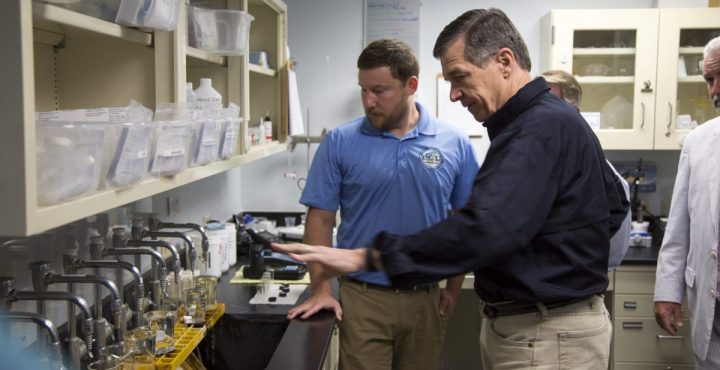
RALEIGH – Calling it “cynical legislation,” Gov. Roy Cooper on Thursday vetoed House Bill 56, the environmental omnibus passed last month that appropriates only local funding for GenX testing, filtration and research, changes stormwater and solid waste regulations and repeals the Outer Banks’ plastic bag ban. Republican leaders were quick to denounce the governor’s action.
Cooper, a Democrat who has strongly criticized the Republican-led legislature for its lack of response to his $2.6 million request for emergency funding made in August, said recent discoveries of GenX groundwater contamination near Fayetteville underline that the problem is not just in Wilmington.
Supporter Spotlight
“The legislation passed by the General Assembly, House Bill 56, provides no resources to the state agencies charged with protecting drinking water and preventing illegal chemicals from being discharged into our rivers,” Cooper wrote in an explanation for the veto posted at Medium.com. “It gives the impression of action while allowing the long-term problem to fester. And it unnecessarily rolls back other environmental protections for landfills, river basins, and our beaches.”
The administration asked for $2.6 million for the Department of Environmental Quality and the Department of Health and Human Services for additional scientists, engineers and water testing and monitoring, but the legislature instead put together a package that would send $185,000 to the Cape Fear Public Utility Authority in Wilmington to help develop filtration methods and continue monitoring and $250,000 to the University of North Carolina Wilmington for further studies on the contamination of the river’s ecosystem and its potential effects.
The local funding provision was added to H56, a multi-part bill introduced last spring that had stalled after House and Senate negotiators failed to reach agreement on key provisions.
The final version of the bill, introduced in the waning hours of last month’s special session on redistricting, passed both chambers mostly along party lines. At the time, Democrats complained that they were shut out of the process and would have supported a standalone bill on the GenX funding, if offered the chance. The bill passed the Senate with enough votes to override the veto, but the margin was closer in the House after three top-ranking members of the Appropriations Committee voted against it.
After Cooper’s announcement Thursday, House and Senate leaders said the governor was playing politics with a serious safety issue.
Supporter Spotlight

“Shame on Gov. Cooper for vetoing a local solution, developed by this region’s local representatives, to immediately improve water quality for their constituents, neighbors and own families – simply because it did not achieve his preferred objective of growing a bureaucracy that has thus far failed to resolve this crisis,” Senate leader Phil Berger (R-Rockingham), said in a statement released after the governor’s veto.
Both Berger and House Speaker Tim Moore called for colleagues to override the veto when they return in early October.
Sen. Mike Lee, R-New Hanover, the Senate sponsor of the local funding provision, echoed Berger and others’ claim that Cooper was using the crisis to restore staffing at DEQ that the legislature had cut.

“I am troubled that the governor would place politics ahead of public safety, and prioritize bureaucracy over results,” Lee said in a statement. “He is now on record for rejecting the only proposal that will actually help clean our drinking water in the lower Cape Fear region.”
But Rep. Deb Butler, D-New Hanover, continued to disagree with other members of the local delegation, saying in a video released on her Facebook page and on Twitter that the governor is right to press for the funding and calling the legislative leadership’s stance pure partisanship.
Butler, who during the budget debate in June first raised the need for additional resources for DEQ because of GenX, said she’s frustrated because the state has ample money available for both the local and state efforts.

“Give the money to UNCW, give some money to Cape Fear Public Utility Authority. Test the sedimentation, find the best filtration, do all that stuff,” she said. “But fund DEQ so our watchdogs can stop the polluters.”
DEQ meanwhile has pressed Chemours, the DuPont spinoff responsible for the discharge of GenX and other compounds, to supply bottled water to households on private wells near its Bladen County facility. The department issued a notice of violation this month when testing showed groundwater contamination near the site.
Moving Forward, Regardless
Officials from both the Cape Fear Public Utility Authority and UNCW say they intend to move ahead with plans for testing and monitoring GenX and other potential contaminants regardless of the outcome of the current disagreement in Raleigh.
“Whatever the fate of House Bill 56, CFPUA will continue to seek out the most advanced water treatment technology and build relationships with our local partners in public health and academia to ensure that we are doing everything we can as a public utility to provide the highest quality drinking water possible,” Jim Flechtner, the authority’s executive director said in a statement sent to Coastal Review Online. “It has long been CFPUA’s position that the State of North Carolina needs strong regulatory agenciesto protect and maintain water quality in the Cape Fear River Basin and beyond. The Cape Fear River is the drinking water source for hundreds of thousands of North Carolinians, and every possible action must be taken to ensure citizens can feel confident in the safety of their drinking water.”
The funding in H56 is intended to help offset some of the authority’s cost to test filtration systems and monitor water quality.
An outline sent by Flechtner to Sen. Lee last month as bill language was being drafted identified five areas in which the authority expects to incur expenses along with project outlines and preliminary costs. They include:
- $90,000 for engineering, water testing and equipment costs at the Sweeney Water Treatment Plant in Wilmington.
- $300,000 for a partnership with UNCW to identify and quantify other compounds in the river.
- $910,000 in costs related to treating and removing 50 million gallons of treated water contaminated with GenX in the authority’s aquifer storage system.
- $85,000 for ongoing GenX monitoring of treated and untreated water at the Sweeney plant.
- $500,000 in legal fees.
The authority estimated that one-time expenses would run about $1.89 million and, if it adopts the carbon filtration system currently under study, the result could be an additional $2 million in annual expenses, according to the document.

At UNCW, Ron Vetter, associate provost for research, said researchers from several departments will be involved in the university’s efforts.
Vetter said Thursday that after reviewing the UNCW-related provisions in H56, he and others began developing plans to study the presence of GenX and other compounds in the river sediments, how they degrade over time and their potential for bioaccumulation.
One study under consideration, he said, would to work with the school’s marine sciences program to measure whether there are any effects on oyster populations.
Vetter said researchers plan to present their ideas at the inaugural meeting of the newly formed House Select Committee on River Quality. The committee, formed last month to provide additional oversight on GenX and water quality issues, was scheduled to meet Thursday in Raleigh.







